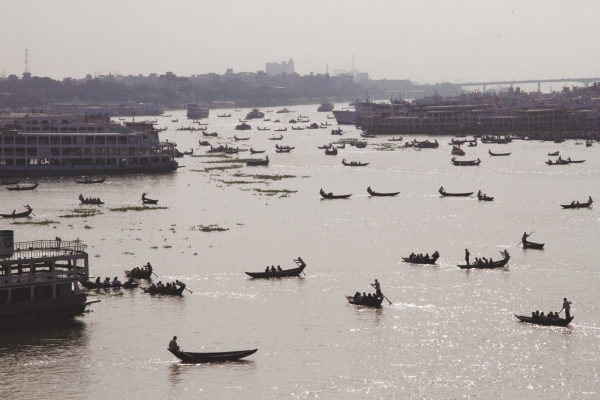| Home - Back Issues - The Team - Contact Us |
 |
| Volume 11 |Issue 43| November 02, 2012 | |
|
|
Impressions
A Touching Tale Shah Husain Imam This is the story of two men from two different worlds. In terms of technological background, economic standing and cultural milieu, they are poles apart. One from the First World and the other belonging to the Third World; the material difference is simply overwhelming between the two. The only thing common between Colin Window and Md. Abdul Loteef, however, is that they both are ferrymen, one a bridge officer on the Woolwich ferry across the Thames in London and the other a boatman ferrying passengers across the river Buriganga in Dhaka. In spite of vastly different settings in which they work, it is their profession that brought them together for two weeks in the middle of the current year in Bangladesh. As they say, 'human beings are more like each other than unlike each other.' Of human bondage, we occasionally come across tales awash with a humane gesture across vast distances. But in many ways, the Colin-Loteef story is in a class of its own. The idea of 'Colin swapping the 1000-ton Woolwich car ferry for a sampan for two weeks, to film a BBC Two documentary, was strikingly innovative and daring, too. It turned out to be "extremely, extremely hard work", by Colin's own admission, but indelibly impressionable for him as he would "try and make some sort of a sense of the whole chaotic nature of what it was like." Eventually, he would come up out with a solution. If it were, however, not for the pains Colin took, the hostile environment he negotiated, the near-shave brushes with accidents he encountered while sharing the rowing with Loteef on the river Buriganga, we would be denied a truly enlightening story of human adventure and compassion. It is so touching that the two men would keep the company of each other, work together and share the burden of carrying goods and passengers across "the most dangerous waterways on earth, especially for the ferrymen," so the BBC storyline read. Colin was appalled that a 70-year-old ferryman had to make more than 60 river crossings a day at Tk 2 per trip to support his family. That was before his luck changed. Although Loteef was 'better off' than other ferrymen who had to rent boats and some even slept in them (he lived in a slum), one day he muttered a Bengali saying to Colin, "If God gave me wings on my arms, I would go back to my village". The British ferryman was soon to learn that if Loteef only had two cows – to farm a plot of land he had in his village home, he could grow lentil and make enough money to support his family (besides milk for nutrition and a little bit of extra earning). Colin, on his return to England, garnered £500 and sent the money to Loteef who would buy cattle and opt back to farming. Thus helped to his feet, by the kindness of the British good Samaritan, he now enjoys his livelihood and a new found self-reliance. For Colin, the joy was an ennobling experience and a rediscovering of himself with insights into the life and living in a developed country as compared with those in a less developed one. Thanks to Frances Cronin's BBC News piece entitled 'The fearless ferryman of Dhaka's Buriganga river' (updated version of 25 August, 2012), the world has come to know of this fantastic, deeply touching, human story. The writer is Associate Editor, The Daily Star. |
Copyright
(R) thedailystar.net 2012 |
